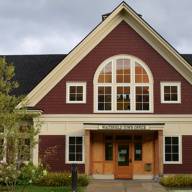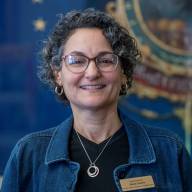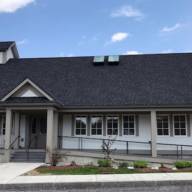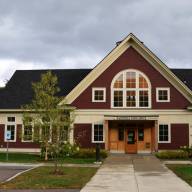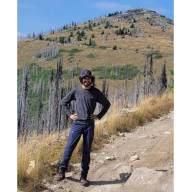February 9 marks the final Jazz Night at Harwood Union High School before the school’s longtime jazz director, Bruce Sklar, retires at the end of the school year. As a Harwood alumnus (class of 2007) and former student of his, I write to celebrate Bruce’s legendary, life-changing career.
The Harwood Jazz Department, and the music program in general, has long earned its reputation as one of the finest in the state. I remember learning that students from other Vermont high schools had dubbed us “The Conservatory,” in some mixture of resentment and admiration. Our jazz band routinely won state competitions. We usually sent several students to the All State jazz band (out of 17 spots) and often made up the majority of the students selected to the Winooski Valley regional jazz band. And in 2006, our program won best large ensemble and best small ensemble in our division at the Berklee College of Music’s High School Jazz Festival, a national competition. We followed it up in 2007 by again winning best small ensemble in our division, even defeating the Los Angeles County High School for the Arts, a magnet school whose purpose is to churn out young talent and win competitions like this.
Bruce has always been the driving force behind this unprecedented success. He possesses the perfect set of skills to harness a talented and motivated, but eccentric and occasionally unruly group of students. Of course his vast knowledge of jazz, honed over a long performance career in the Northeast, was crucial for making sure we sounded right and did the music justice. But beyond that, his personality, teaching style, and sense of humor really resonated with us. Bruce is equal parts erudite professor, caring mentor, and kooky uncle. He often had us in stitches with his funny turns of phrase and references to decades-old pop culture. But in the same breath, he would explain what kind of vibrato the saxophones needed to play Duke Ellington’s music authentically, or identify which obscure musical scale was implied by an equally obscure chord. Most importantly, Bruce inspired us to play to the top of our ability, because we knew he could bring us the success we wanted as long as we put in the work. When asked to imagine a jazz band director, you might think of J.K. Simmons’s character in the movie “Whiplash,” who somehow wrings good art out of his students by abusing and manipulating them. I’d argue Bruce’s method is not only more humane but much more effective.
And yet, despite all that success, Bruce’s position at Harwood somehow always seemed in danger of being cut. I remember one year when jazz students and their families practically overran a school board meeting to make speech after speech about why Bruce needed to stay. It saddens and frustrates me to learn that Bruce’s position, along with that of the retiring (and equally accomplished) band director Chris Rivers will have to be filled by only one person, when Bruce and Chris’s work together, and the resources they’ve been given, have helped make Harwood a measurably special place.
As hard as it will be to fill their shoes, it would be a real tragedy to scale back jazz and music education at Harwood, for a few reasons. First, the Harwood jazz department has produced more notable, high-quality musicians than a public school in Vermont has any right to expect. Grace Potter needs no introduction. Shaina Taub has won multiple awards and made a name for herself in the New York theater scene and as a singer-songwriter. My friend and classmate Josh Bruneau is one of the finest trumpet players on the New York jazz scene today and has gotten to perform with so many of the legendary musicians whose albums we grew up listening to. My other friend and classmate Dan Liptak became the band teacher at Crossett Brook Middle School, and now he carries music education forward in our community.
But I’m also reminded of a commercial that used to air during March Madness college basketball. The ad said that most the student athletes would “go pro in something other than sports,” but their experience in the tournament would stay with them forever. That’s how I feel about my time in the Harwood jazz department because what I learned there has helped me for the rest of my life. Bruce taught me how to be creative with a group of people; how to listen and respond while thinking on my feet; how to find my unique voice; and how to care deeply about honing my craft. Those skills have served me well in my career as a trial attorney, and I’m positive they would be useful to any motivated student with the privilege of passing through Bruce’s jazz program.
I’m also thankful for the non-musical lessons I’ve learned from Bruce. He spoke to us effectively about issues like racial and religious tolerance at a time when many people were too nervous or ignorant to do it well. As a Jewish man who has dedicated his life to Black music in, frankly, a pretty homogenous state like Vermont, Bruce was in a good position to have those conversations, and he rose to the occasion. I remember him gracefully but firmly giving us much-needed perspective about learning Jewish Klezmer music for a holiday concert, and setting us straight if we veered too close to cultural stereotypes. He also has strong opinions about hot sauce and will share them if you ask.
I hope the Harwood community will join me in congratulating Bruce on his retirement and in thanking him for the incalculable impact he has left on so many students’ lives. And please join us at Harwood on February 9 at 7 p.m. to celebrate Bruce’s last student jazz concert in a storied educational career.
Hardin is from Duxbury and an alum of Sklar’s jazz program. He is a pianist and now lives in New York City.


